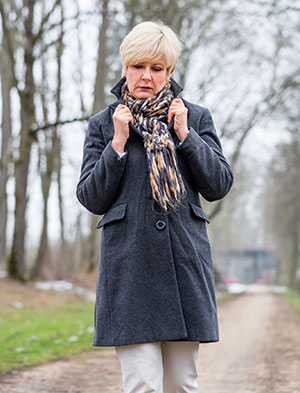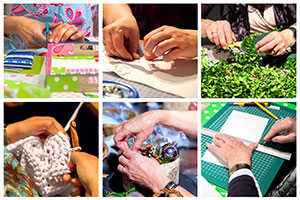Fun Ways to Chase Winter Blues Away

Less daylight and winter weather can have an adverse impact on our mental health. Older people are even more affected by the snow and cold because apart from facing common chronic diseases that come with aging, they can also be more susceptible to the winter blues.
Winter and lack of sunlight impacts everyone's mood. Seasonal Affective Disorder can be especially disruptive for older people increasing their dependence on others for daily activities.

Winter sadness or Seasonal Affective Disorder (SAD) affects roughly 5% of Americans, with another 10-15% having a milder variation of this condition. You’ll know if an elderly loved one is experiencing winter sadness if he shows signs of depression, experiences changes in their appetite and cravings, is irritable, anxious, or has a difficult time falling asleep.
Even before the COVID-19 virus crisis, many people, especially the elderly, were lonely. In 2018 there was a record-breaking number of people who reported feeling some form of loneliness before coronavirus.
While there is less isolation today as more people have been vaccinated, some older people still avoid getting out because of the fear of getting sick.
Americans are now, more than ever, craving the physical touch and companionship of our loved ones. But with winter weather, cold, snow, and clouds, seasonal depression becomes worse.
Because SAD can last for months, it's essential to help seniors chase the blues away and be healthier both physically and mentally during the winter season.
Older people are not the only ones who suffer from SAD. SAD usually starts during adulthood, according to John Hopkins University Health. The risk of SAD increases with age and women are affected more often than men.
Here are some fun ways to chase the winter blues away.
Take up a new hobby
 It may be tempting to curl up on the couch and watch TV all day when it’s cold outside, but doing something productive may be better to keep winter sadness at bay. Taking up a new hobby such as embroidery, assembling jigsaw puzzles, or coloring in adult coloring books can help you pass the time in a beneficial way as all of these activities can help to keep the mind active.
It may be tempting to curl up on the couch and watch TV all day when it’s cold outside, but doing something productive may be better to keep winter sadness at bay. Taking up a new hobby such as embroidery, assembling jigsaw puzzles, or coloring in adult coloring books can help you pass the time in a beneficial way as all of these activities can help to keep the mind active.
When you do things that challenge your brain, this results in better mental health and may even help to prevent dementia.
Exercise
 You may not feel like going for a walk or a run when it’s snowing outside, but there are other ways to stay active, keep fit, and chase the winter blues away. You can join a senior ballroom dancing class at your local community center or go for a walk in the mall. If you love to exercise, why not create a home gym so you can stay fit without breaking the bank? Try exercising along to a workout DVD, lifting light weights, or do yoga. Whatever you choose to do, make sure to be consistent and exercise at least three times a week for your physical and mental health.
You may not feel like going for a walk or a run when it’s snowing outside, but there are other ways to stay active, keep fit, and chase the winter blues away. You can join a senior ballroom dancing class at your local community center or go for a walk in the mall. If you love to exercise, why not create a home gym so you can stay fit without breaking the bank? Try exercising along to a workout DVD, lifting light weights, or do yoga. Whatever you choose to do, make sure to be consistent and exercise at least three times a week for your physical and mental health.
Stay social
 Though most people would like to hibernate when it’s cold outside, maintaining your favorite social activities can help to boost your mood and keep the winter blues away. Invite your friends for a winter potluck, or meet up for coffee at a warm and cozy coffee shop. Staying social prevents you from becoming isolated and lonely during the cold winter months.
Though most people would like to hibernate when it’s cold outside, maintaining your favorite social activities can help to boost your mood and keep the winter blues away. Invite your friends for a winter potluck, or meet up for coffee at a warm and cozy coffee shop. Staying social prevents you from becoming isolated and lonely during the cold winter months.
This winter, follow these tips to keep winter sadness away. Doing so enables you to stay healthy and happy during the long cold months.
Medical Treatment for SAD
There are medical treatments available for SAD:
- Get Some Sun. Spending time outside or near a window can help relieve symptoms if the sun is out.
- Light therapy. If the sun isn't out, exposure to a special light designed for those who suffer from SAD can be helpful.
- Psychotherapy. Cognitive-behavioral or interpersonal therapy improves interpersonal relationship skills and identifies things that cause you to stress and how to manage them.
- Antidepressants. These prescription medicines can help correct the chemical imbalance that may lead to SAD.


